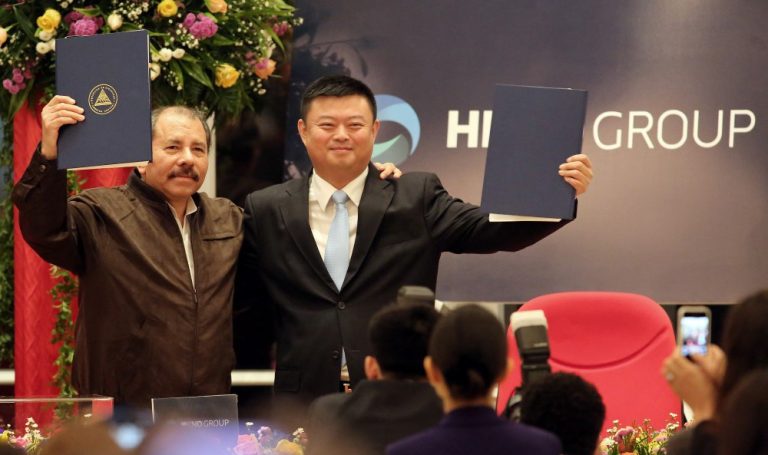30 de marzo 2017

Children of Exile: The Births “Sowing Hope” in the Camp of Nicaraguan Farmers

PUBLICIDAD 1M
PUBLICIDAD 4D
PUBLICIDAD 5D
While the peasant anti-canal movement demands Ortega overturn the canal law, Chinese billionaire Wang Jing is still missing.

Wang Jing congratulated Ortega and Murillo for their reelection and affirmed his “faith in the project” he once promised to build
The Hong Kong Nicaragua Development consortium (HKND) – owned by Chinese businessman Wang Jing, who in June 2013 received a concession from commander Daniel Ortega to build an interoceanic canal in Nicaragua – has reduced operations to a minimum in the country.
The news comes from Confidencial sources linked to the government and the private sector. “The information we received from above is that the canal will never be,” said a government source who declined to give details.
After inaugurating the first “works” of the canal in an act of propaganda celebrated in the zone of Brito on the southwestern coast of Nicaragua in December 2014, the Chinese tycoon, owner also of the telecommunications company Xinwei, has virtually disappeared. There is no news from Wang on the Xinwei website and even less on the HKND website.
The contract with the public relations company in charge of promoting Wang’s agenda in Nicaragua was canceled in view of the fact that there is no relevant activity to disclose.
On the HKND website, there is an April symposium on archaeological research, or the opening in July of an educational reforestation program in Rivas. But there is no information on bidding for construction works, or the purchase of land from farmers along the canal route.
The last activity developed by HKND was the sponsorship, two weeks ago, of the Second Pucciniano Festival of Latin America, without mentioning that one of the tenors who acts in the work, is Laureano Ortega Murillo (whose photo was published) son of the presidential couple and the plenipotentiary liaison of the government with the Chinese company.
‘Eichkandí’ (as HKND’s Chinese officials call it) started by offering a portfolio of multi-million-dollar sub-projects that included airports, railways, pipelines, ports on both oceans, roads, resorts, cement, steel and explosives manufacturing, in addition to exploring with the productive sector the purchase of grains, meat and vegetables to feed 25,000 workers.
Paul Oquist, the presidential advisor on public policy, assumed the international promotion of the project, promising that it would reduce extreme poverty from 14% to 7%, and that the economy could grow at double digits per year.
But none of these offers came to fruition. What HKND did was to start signing contracts with major international companies of reputed reputation for advice on legal, commercial, environmental or design issues.
In the process, the announced road that started the project is still an 8 mile dirt road, while thousands of peasants continue protesting against the threat of forced expropriation from the project valued by Wang Jing at US $50 billion.
After making a lot of noise, the promise turned into complete silent. Meanwhile in Managua, there are several empty apartment buildings, which according to realtors were intended to welcome the arrival of hundreds of Chinese technicians and engineers who would come to build the canal project.
Wang Jing stopped coming to Nicaragua over two years ago and no longer invites Nicaraguan business committees to visit Beijing and Hong Kong.
Since then, the presence of HKND has been gradually declining. The major consulting firms completed their contracts, leaving their studies as secret as in the case of McKinsey, or simply left the ship before it sailed.
Private sector leaders who initially were enthusiastic about the promises of HKND and the government, were left waiting for Wang to show his investment muscle. “As long as Wang Jing doesn’t show the money and start buying land on the canal route, the canal does not exist,” said one businessman.
Meanwhile, the peasant movement led by Francisca “Chica” Ramírez, has called for a new protest march in Juigalpa on April 22nd, Earth Day, to demand that President Ortega rescind the canal law.
This article has been translated from Spanish by Havana Times.
Archivado como:
PUBLICIDAD 3M
Confidencial es un diario digital nicaragüense, de formato multimedia, fundado por Carlos F. Chamorro en junio de 1996. Inició como un semanario impreso y hoy es un medio de referencia regional con información, análisis, entrevistas, perfiles, reportajes e investigaciones sobre Nicaragua, informando desde el exilio por la persecución política de la dictadura de Daniel Ortega y Rosario Murillo.
PUBLICIDAD 3D